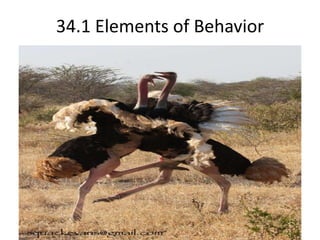
Biology 34.1
- 1. 34.1 Elements of Behavior
- 2. Behavior The way an organism reacts to changes in its internal condition or external environment.
- 3. Stimulus A signal to which an organism responds.
- 4. Response Single, specific reaction to a stimulus.
- 5. Innate Behavior Instinct, or inborn behavior; behavior that appears in a fully functional form the first time it is performed.
- 6. Learning Alterations in behavior as a result of experience; also called acquired behavior.
- 7. Habituation Learning process by which an animal decreases or stops its response to a repetitive stimulus that neither rewards nor harms it.
- 8. Classical Conditioning Learning process in which an animal makes a mental connection between a stimulus and some kind of reward or punishment.
- 9. Operant Conditioning Learning process in which an animal learns to behave in a certain way through repeated practice, in order to receive a reward or avoid punishment; also called trail-and-error learning.
- 10. Insight Learning Also called reasoning; learning process in which an animal applies something it has already learned to a new situation without a period of trail and error.
- 11. Imprinting Learning based on early experience; once imprinting has occurred, the behavior cannot be changed.
- 12. Key Concept When an animal responds to a stimulus, body systems including the sense organs, nervous system, and muscles interact to produce the resultant behavior.
- 13. Key Concept Innate behaviors appear in fully functional form the first time they are performed, even though the animal may have had no previous experience with the stimuli to which it responds.
- 14. Key Concept The four major types of learning are habituation, classical conditioning, operant conditioning, and insight learning.